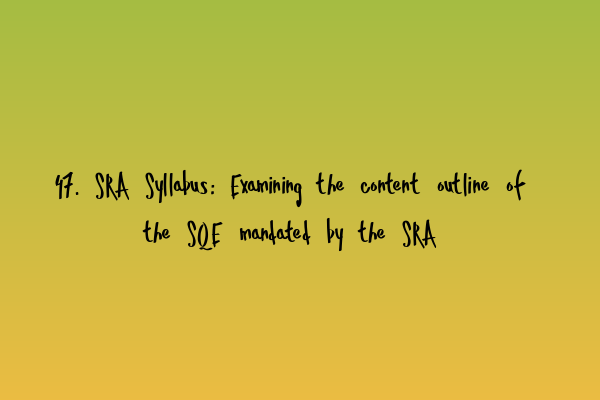47. SRA Syllabus: Examining the content outline of the SQE mandated by the SRA
Welcome to SQE Exam Law, your trusted source for all things related to the Solicitors Qualifying Exam (SQE). In this blog post, we will delve into the SRA syllabus and examine the content outline of the SQE mandated by the Solicitors Regulation Authority (SRA).
Before we proceed, if you’re looking for tips on how to conquer the Multiple Choice Questions (MCQ) in SQE1, be sure to check out our related article: Conquer the Multiple Choice Questions (MCQ) in SQE1. It’s packed with valuable insights to help you excel in that particular section of the exam.
Now, let’s dive into the SRA syllabus for the SQE and explore the key areas of knowledge and competence that candidates must demonstrate.
1. The Legal System and Legal Method
The first component of the SQE syllabus focuses on the fundamental understanding of the legal system and legal method. It covers topics such as the sources of law, the hierarchy of courts, and legal reasoning. By mastering this area, candidates will be equipped with the necessary knowledge to navigate the complex world of law.
2. Dispute Resolution
Dispute resolution is a crucial aspect of legal practice. The SQE syllabus places significant emphasis on understanding different methods of resolving disputes, including negotiation, mediation, arbitration, and litigation. Candidates will need to demonstrate their ability to analyze and apply the appropriate dispute resolution mechanisms in various scenarios.
3. Contract Law and Tort Law
Contract law and tort law are foundational areas of legal knowledge that every solicitor must grasp. The SQE syllabus covers these topics in detail, ensuring candidates are well-versed in the principles and concepts pertaining to contracts and civil wrongs. An in-depth understanding of these areas allows solicitors to advise their clients effectively.
4. Constitutional and Administrative Law
The SQE syllabus also delves into the realm of constitutional and administrative law. Candidates will be required to comprehend the underlying principles of the UK’s constitutional framework, as well as the powers and limitations of administrative bodies. This knowledge is essential for solicitors engaged in public law matters.
5. EU Law and Human Rights
In an increasingly globalized world, knowledge of EU law and human rights is vital for solicitors. The SQE syllabus covers these areas extensively, enabling candidates to understand the legal framework of the European Union and the fundamental rights protected under human rights law. This knowledge is particularly relevant when advising clients with cross-border interests.
6. Property Law and Practice
Property law and practice form an integral part of legal practice, and the SQE syllabus recognizes their significance. Candidates will need to demonstrate their understanding of property transactions, including the purchase, sale, and lease of land and property. Mastery of property law and practice facilitates effective representation of clients in real estate matters.
7. Wills and Administration of Estates
The final component of the SQE syllabus focuses on wills and administration of estates. Candidates will be evaluated on their ability to advise clients on the creation of wills and the administration of estates in accordance with legal requirements and best practices. This area of law is essential for solicitors engaged in private client work.
If you’re seeking interactive mock tests to enhance your engagement and learning experience while preparing for the SQE, our related article might interest you: Interactive mock tests for SQE: Enhancing engagement and learning. It provides valuable insights into how mock tests can contribute to your exam success.
In conclusion, the SRA syllabus outlines the key areas of knowledge and competence that candidates must demonstrate in the SQE. By understanding the content and focusing on exam-relevant topics, you can increase your chances of success. For practice materials and sample papers to further enhance your exam preparation, visit our related article: SQE Sample Papers: Practice for Exam Success.
Remember, adjusting your SQE strategy based on mock performance can be a game-changer. Check out our related article for valuable insights on this topic: Adjusting Your SQE Strategy Based on Mock Performance. It may help you fine-tune your approach and maximize your chances of achieving a successful outcome in the SQE.
Thank you for reading SQE Exam Law, your go-to resource for SQE-related information. Stay tuned for more updates and expert tips to support your SQE journey.
